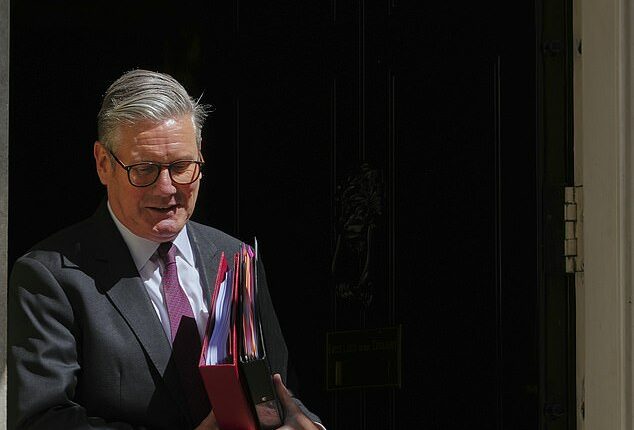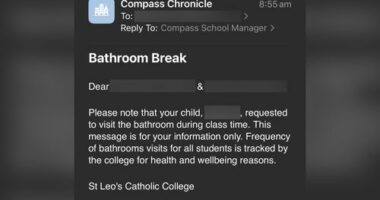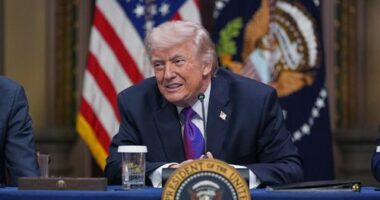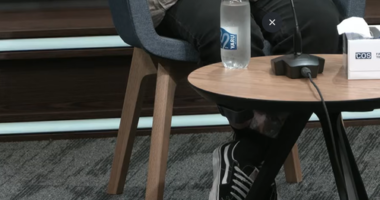Share this @internewscast.com
Britain cannot endure another four years of indiscriminate government spending. Continued financial exploitation of the private sector to appease public-sector demands cannot last. Surrendering control to foreign entities like Mauritius and the EU must cease.
The country cannot sustain four more years of ineffective immigration policies. Continuing crime in public places, the unjust imprisonment of individuals for expressing opinions, and the premature release of offenders should not persist. Neither should the ongoing climb of living costs, taxation, and joblessness.
Is there a way to cut this distress short? According to the 1911 rule, parliaments cannot extend beyond five years, which means this session must conclude by July 9, 2029. Without a call for dissolution by the Prime Minister, the next election is due on August 15, 2029—marking a four-year wait.
The situation is disheartening. Labour has exhausted its authority and is polling at a mere 21 percent, with little hope for improvement. Its cycle of policies—higher taxes, dwindling revenues, reduced investment, emigration, increased joblessness, and more taxes—seems endless. By the next election, Britain could be reduced to just its welfare system, which too may falter.
Yes, we’re a law-based democracy. Yes, rules are rules. But really – another four years?
While the five-year term in our parliamentary system is slightly above average globally, countries like Germany, Spain, and the Netherlands opt for four years. Australia and New Zealand prefer even shorter, three-year terms. In contrast, the U.S. operates on varied terms: the House serves for two years, the Presidency for four, and the Senate for six.
Five years should sufficiently allow a government to execute its policies and face evaluation. There’s often a conflict between short-term appeal and long-term success. Measures like budget cuts may be unpopular initially, but the economic growth they support can lead to electoral success later on.
Five years, so the reasoning goes, allows a government to make tough decisions at the beginning of its term and then face the voters when the benefits start to become visible.

If the PM has not asked for dissolution beforehand, the next election will automatically take place on August 15, 2029 – exactly four years’ time, writes Daniel Hannan

The Prime Minister and Lady Starmer outside No 10 on the morning after winning the General Election
That, at least, is the theory. In practice, this administration, despite winning a majority of more than 400 just a year ago, has already lost its capacity to govern. Consider the attempt, earlier this summer, mildly to slow the rise in benefits claims.
The reforms should have been uncontroversial. In the rest of the world, benefits claims surged during lockdown and then fell back again. In the UK, uniquely, they have continued to rise – from £244billion a year on the eve of the pandemic to £303billion today (adjusting for inflation).
Everyone knows the cause: not a sudden spike in disability, but perverse incentives. An army of online ‘sickfluencers’ has grown up, coaching people in what answers to give to qualify.
Around 3,000 people a day are being signed off as too sick to work. The total number of claimants is forecast by the Government to go from 3.3million to 4.1million by the end of this parliament.
Labour likes to think of itself as a party for workers (the clue is in the name). So ministers placed a very modest proposal before MPs aimed at bringing the perverse incentives back into balance. It was surely absurd that benefits claimants would soon be £2,500 a year better off than people earning the minimum wage.
Sadly, it became clear that today’s Labour MPs are not prepared to countenance any cuts, however moral or necessary. In around 200 constituencies, the number of working-age adults claiming sickness benefits is bigger than the Labour majority. The workers’ party has become the shirkers’ party.
When the vote was eventually held on July 1, a measure originally intended very slightly to slow the increase in benefits payments ended up actually accelerating it.
That vote followed a climbdown on the attempt to restrict winter fuel payments to poor pensioners, and will be followed by the lifting of restrictions on child benefit imposed by the previous government.
Labour has signalled to the world that it has lost control. If it cannot make these small (and, in the country at large, popular) tweaks to the benefits system, forget plans for radical NHS reform or building more houses. We are already at the lame duck stage.
What, then, might precipitate an earlier poll? If Starmer were replaced, might a new leader feel the need to get his (or more likely her) own mandate? Might there be such a gridlock that an election is the only way out, as during the Brexit-blocking mess of 2019? Or might an exhausted, enfeebled and enervated government feel that it has no choice but to let someone else have a go?

A demonstrator holds a sign reading ‘Labour taking the dis!!’ at the Disabled People Against Cuts protest against Pip and benefits cuts in March

A protester holds a placard calling Sir Keir a ‘Farmer Harmer’ as thousands of farmers staged a protest against inheritance tax in November

We face ‘four more years of talking tough on immigration while doing nothing to deter it,’ writes Daniel Hannan
All these scenarios have happened in the past. But I can’t see any of them applying now. Look again at the opinion polls, as you may be sure every sitting Labour MP is doing. The next election is going to throw most of them out of work. Good luck trying to find a job after having propped up this of all governments.
No, Labour MPs will do anything to avoid an early election. Every week that they can string things out is another week of salary and another week of generous pension contributions.
Is there any way of waking earlier from this hideous fever dream? I can think of only one. Suppose Britain’s debt and deficit were to worsen to the point that the markets were no longer prepared to lend its government money – not, at any rate, without the kind of high interest rates that would reflect a fear of default.
We are currently borrowing nearly £150billion a year, of which £100billion is used to pay interest on existing debt. Yes, you read that correctly: to pay interest on it, not to pay it back.
What would happen if that tap were turned off? How would the government be able meet basic payroll – to cover the wages of soldiers, teachers and nurses? The answer is that it would have to make cuts, and vastly deeper cuts than those which its MPs have just rejected.
Yes, it might wriggle around for a bit, hoping to reduce the debt through hyper-inflation, and exhausting such non-solutions as taxes on savings, houses and inheritance. But, in the end, gravity can’t be defied. The cuts must come.
Are Labour MPs capable of voting for a real austerity package? The same MPs who were not prepared to slow the growth in benefits by £5billion? If not, the vote would eventually become a confidence motion and, if they continued to reject the cuts, there would be only two options.
Either an alternative administration, presumably some kind of national government made up of Tories, Lib Dems and that portion of Labour prepared to vote for the cuts; or, which would be simpler all round, a snap poll.
Is it unpatriotic to hope for a financial crisis? Perhaps in normal circumstances. But I am afraid it is now our least bad option. Ireland had to make serious savings after the euro crisis in 2008 – everyone from MPs to recipients of unemployment benefit took a cut – and it has, since then, been the fastest-growing economy in the EU. The quicker we take our medicine, the better.
Lord Hannan of Kingsclere is a Conservative peer.












